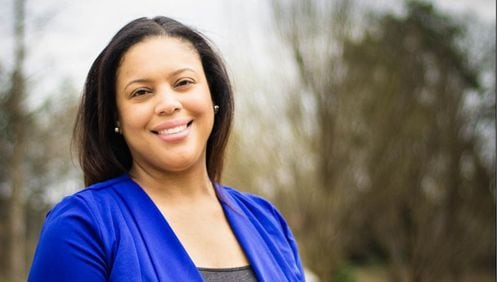Cobb County voters will elect two school board members Tuesday. In District 6, incumbent Scott Sweeney (R), will face Charisse Davis (D). Here are some basics on those two candidates.
Charisse Davis, the challenger, is a 15-year educator and mother of two boys in Cobb County schools. She taught kindergarten before earning a Master of Library and Information Science degree, and became a media specialist for grades K through 6. She also obtained a specialist degree and now works as a librarian in the Atlanta-Fulton library system. She volunteers in school and served on her sons' local school council and the leadership boards of the PTA and parent foundation.
Davis says she has spent her adult life working with children and has firsthand experience as an educator with experience ranging from educational theory to policies.
“My teaching experience is also recent experience, meaning that I understand the challenges that students and staff face in today’s educational climate,” she said.
“While the Cobb County School District has always been considered to be a good school district, I want to ensure that we are continuing to reflect, grow, and challenge ourselves so that we can be a great school district for all of our students, no matter how they learn.”
She says Cobb priorities are expanding early learning to more schools and students, which is critical.
“This is not about teaching young kids how to read; it is about establishing a foundation for students that will yield benefits for many years to come,” she said.
Other priorities are reaching students with learning disabilities or those who learn best with alternative teaching methods.
“Students who might learn differently or need extra support need our school board to find ways to help them. I am ready to listen, to identify the areas where we are falling short, and find solutions to those problems.”
School safety is another key concern — from environmental safety in buildings to bodily safety of students and staff. She says school safety can be enhanced with proactive work such as finding troubled students early and working with them. She wants safety to be viewed and acted on comprehensively, from school safety to bus routes and crossing guards.
Cobb is implementing a technological alert system that allows teachers to alert authorities from classrooms. Davis wants to implement not just reactive but proactive methods to ensure safety.
“There are programs that focus on social and emotional learning so that we can try to prevent the kinds of tragedies that have been taking place. Additionally, in discussing student safety, we need to consider the safety of our children as they get to and from school (crossing guards, safe routes, etc.) and environmental safety as it pertains to the health of our buildings where teaching and learning are taking place.”
Scott Sweeney is finishing his second term on the Cobb County school board and has served in multiple roles including chairman, budget liaison, facilities and technology liaison and other positions. President of the Georgia Education Coalition, he also served on the Georgia School Board Association Strategic Planning Committee, Government Operations Council; and Cobb Chamber of Commerce Legislative Affairs Committee.
Sweeney earned his bachelor’s degree in economics from UCLA and is senior business advisor for InPrime Legal. He is a business executive with more than 34 years experience in financial and budget analysis, managing multimillion-dollar budgets, developing new business, project leadership, sales, operations and real estate development. He and his family have lived in Cobb County 22 years.
“Aside from business development, my primary work role always involved working on big-picture strategy. Specifically, what is it going to take for our operations to be successful? How can we ensure that we’re getting the best value when it comes to delivering quality education? … When discerning matters that come before the board, I use my business acumen and experience, constituent and administration input, and eight-year experience as a school board member when arriving at decisions,” he said.
Key issues are budget, safety, early education and communication with the Legislature. “Uncertainty regarding state revenues is a concern,” he said. The state fully funded schools this year but there are no guarantees for the future. “I will continue my ongoing efforts with our local delegation to alert them to the funding challenges our district encounters each year,” he said.
He supports Cobb’s safety initiatives, which have armed officers at each middle and high school, school drills, improved entry procedures and the implementation of the high-tech Alert Point system, which allows teachers in each classroom to send alerts to police, schools and state law-enforcement.
He will push to continue expanding Early-K, a which lets kindergarten students begin school two to three weeks early to build their reading skills.
“The focus is on building reading skills and the pilot program results showed 100 percent of students were on grade level at the end of their first year in school. I will support expanding this program,” he said.
Sweeney supports the district’s testing alternative program, which incorporates a higher concentration on quick response, formative assessments rather than end-of-year tests such as the Georgia Milestones tests. Cobb is one of the Georgia counties that sought and has preliminary approval to use locally devised tests to assess student performance rather than standardized tests. The end-of-year tests have been criticized because teachers get the results back too late to help struggling students.
“The real-time data will permit teachers a greater opportunity to focus their instructional efforts to meet individual student instructional needs,” he said.






